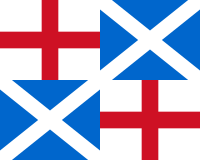
Back الحرب الإنجليزية الهولندية الأولى Arabic Primer Guerra anglo-neerlandesa AST Birinci ingilis-holland müharibəsi Azerbaijani بیرینجی اینگیلیس-هولند ساواشی AZB První anglo-nizozemská válka Czech Englisch-Niederländischer Krieg (1652–1654) German Primera guerra anglo-neerlandesa Spanish نخستین جنگ انگلستان و هلند Persian Ensimmäinen Englannin–Hollannin sota Finnish Première guerre anglo-néerlandaise French
| First Anglo-Dutch War | |||||||
|---|---|---|---|---|---|---|---|
| Part of the Anglo-Dutch Wars | |||||||
 The Battle of Scheveningen, 10 August 1653, Jan Abrahamsz Beerstraaten | |||||||
| |||||||
| Belligerents | |||||||
|
|
| ||||||
| Commanders and leaders | |||||||
| Strength | |||||||
| 1653: 154 warships[b][1] | |||||||
| Wars of Interregnum England |
|---|
 |
|
|
The First Anglo-Dutch War, or First Dutch War,[c] was a naval conflict between the Commonwealth of England and the Dutch Republic. Largely caused by disputes over trade, it began with English attacks on Dutch merchant shipping, but expanded to vast fleet actions. Despite a series of victories in 1652 and 1653, the Commonwealth was unable to blockade Dutch trade, although English privateers inflicted serious losses on Dutch merchant shipping.
The economic damage eventually led to the Treaty of Westminster in 1654 where the Dutch were forced to make minor concessions to the Commonwealth. Both sides agreed to the exclusion of the House of Orange from the office of Stadtholder, but failed to resolve underlying commercial issues. In 1665, Dutch objections to the Navigation Acts and English concerns over their rival's trading practices led to the Second Anglo-Dutch War.
Cite error: There are <ref group=lower-alpha> tags or {{efn}} templates on this page, but the references will not show without a {{reflist|group=lower-alpha}} template or {{notelist}} template (see the help page).
- ^ Brandon 2015, p. 87.